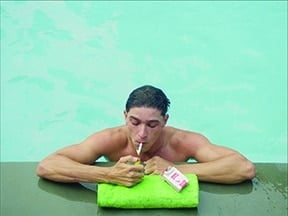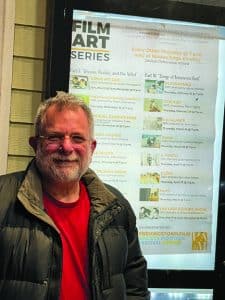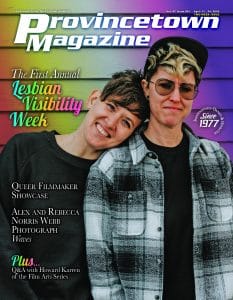Sean Baker on Filmmaking on the Edge
by Rebecca M. Alvin
The Provincetown International Film Festival has celebrated “filmmaking on the edge” for 20 years now. Their annual Filmmaker on the Edge Award has been given to a list of filmmakers who each approach that edge in unique ways. Ang Lee, Todd Haynes, Jim Jarmusch, Guy Maddin, Sofia Coppola, Roger Corman, Gus Van Sant—these are just some of the filmmakers to win the award since 1999, and as you can see, they come from different areas of the independent film spectrum, with some finding success in crossover Hollywood films and others staying in the distinctly separate space of indie cinema.
This year’s honoree, Sean Baker comes to us fresh from the success of The Florida Project, which premiered in the Directors’ Fortnight section of the Cannes Film Festival and earned Willem Dafoe a best supporting actor Oscar nomination. Prior to that, his film Tangerine received critical acclaim and popular notoriety for both its portrayal of transgender sex workers and Baker’s exclusive use of iPhone cameras to create a super-saturated, unique look that matched the street milieu of its characters.
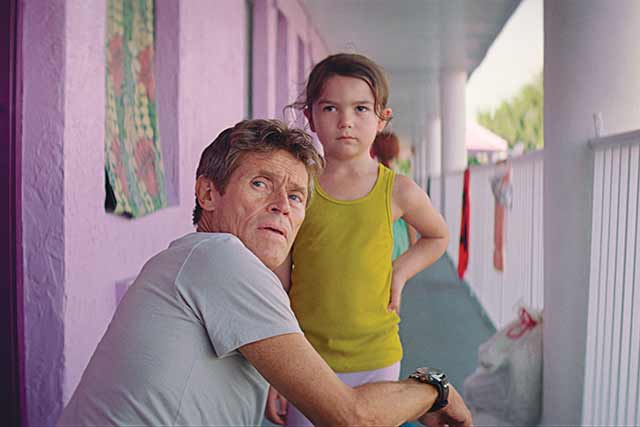
Photo: Courtesy of A24
Just as Italian directors in the late 1940s eschewed cinematic contrivances like three-act plot structure, artificial lighting, and professional actors to combat fascism with the new Italian Neorealist cinema, Baker consciously works in ways that are contrary to the standard Hollywood approach in order to address real issues and give visibility to real people on the screen. Part of that process is writing stories that take place in marginalized environments and then telling them with characters portrayed mainly by real people from those worlds.
“Tangerine really opened doors for us there because we cast a lot of the supporting actors either off of YouTube or Instagram or Vine. Now that Vine is dead, we have to look other places, but Bria Vinaite [who played Halley in The Florida Project], I found her on Instagram,” Baker explains in a telephone interview. “And it’s the same with street casting. You find somebody based on their physicality, but then also their persona that they’re putting out there. But then you have to actually meet with them, you have to test them, you have to see if they have that enthusiasm and even that skill to be there,” he adds.
Casting Dafoe alongside first-time actors and nonprofessionals in The Florida Project created an interesting dynamic where everyone learned from each other’s experiences. “We’re trying to, with these films, bring fresh faces to the industry, and we’re trying to give opportunities to those who would normally not have the opportunities,” explains Baker.
Stylistically, Baker’s approach is similar to that neorealist cinema of 70 years ago. Sound design consists mostly of what is captured on location, editing is used to create pace, but doesn’t serve to soften the cuts, and the performances feel authentic whether the lines are improvised or scripted or some blend of both, as they often are in Baker’s films. At the same time, Baker, who refers to his approach as social realism, is not afraid to heighten with a cinematic element such as music, which he does a lot in Tangerine. But perhaps the most remarkable element of his style is the dialogue, which is written in a way that always emphasizes authenticity.
“Some of it is scripted to the word. And that really just comes from observation, taking enough time and absorbing everything. So, when you’re hanging out doing interviews with people from whatever world you’re focusing on, you’re keeping your eyes and ears open at all times for slang that might come your way…There’s a lot of eavesdropping,” he says with a laugh. “And then of course there is collaboration with those who have lived those lives,” he adds. This is not only the case for the first-timers and nonprofessionals, but also the seasoned actors who are just as likely to have experiences to bring to it. “I’m always open to asking my actors to keep it loose on set, and people who have actually had parallel experiences to those of the characters, that could be anybody. That could even be Willem Dafoe… because he had a son and he talked to us about his relationship with his son, how he would act with his son, and therefore when we actually got to those scenes, I was allowing him to bring a lot there. So yes, that scene was scripted, but he added in one or two lines that he felt would be important from a father to a son, something that I don’t know because I’m not a parent,” Baker explains.
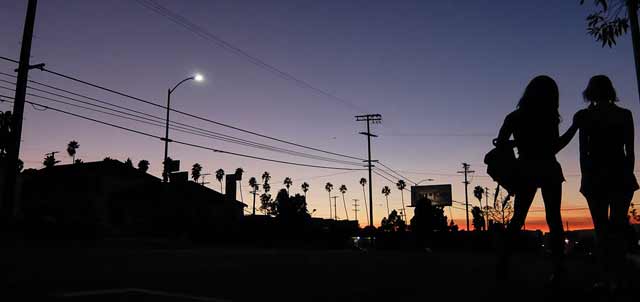
Photo: Courtesy of Provincetown International Film Festival
He’s been referred to as the ultimate humanist filmmaker, and this is no accident. Asked how he connects with these characters who really don’t live lives that look anything like his own, Baker says it’s just a matter of treating the characters the way you would want to be treated by a writer writing about you. It’s about “looking to basically humanize our characters enough so that people all over the globe, no matter what background an audience may be from, they are able to connect with these characters on just a human level, you know, finding a common thread and all that stuff. That’s what the connection is,” he says.
In a time where Hollywood movies continue to be formulaic despite the intensity of the times, the NYU Film School graduate has crafted a body of work designed to be both creatively challenging and accessible to the mainstream audiences he wants to reach. He and his frequent collaborator, writer Chris Burgach, both know their way around three-act structure and the tyrannical formulas of mainstream filmmaking, but Baker is not interested in complying with those rules any more than he has to.
“I enjoy my [Andrei] Tarkovsky 10-minute dollyshot. I actually love that! I love stuff that doesn’t have the structure, or really combats the conventional structure. But I understand that also I’m making films that I want the mainstream to see because of the issues that we’re usually focusing on,” Baker admits, adding that Burgach keeps him from straying too from structure.
The issues that come up in his films are pressing ones that are often obscured by lack of representation in American media: the lives of immigrants (Prince of Broadway and Take Out), the world of transgender prostitutes in Los Angeles (Tangerine), the hidden poverty that exists in some of the most celebrated destinations (The Florida Project). Telling these stories in this organic, character-centered approach is in fact what makes these films succeed in shedding light on these issues so effectively.
“You take the classic structure and then you try to disguise it. That’s basically what I do. So I try to erase the act breaks, and then also on top of that I try to disguise whatever I have. So, for example, Tangerine is pretty much a buddy comedy! And in many ways it’s a romp; it’s a buddy comedy, but we disguise it so that audiences aren’t really sure how to take it, but they are seeing something they find familiar in it,” he explains.
The Festival will present Baker with his award at their annual Conversation with the Honorees event this Saturday, which includes an onstage interview with John Waters. In addition, his film Tangerine will also be shown in special screenings over the weekend.
Baker says he’s never been to Provincetown, but is really looking forward to it. “I hear it’s quite beautiful. And also, of course, to meet John Waters! I’m bringing my dogs, so I’m going to make it a little bit of a vacation,” he says.
Baker is just in the early stages of his next project now. “We’re really trying to figure it out. We do know that we have been exploring the topic of the opioid crisis in the United States. And how we would approach that, we don’t know yet. But that’s one subject that I’m passionate about, because I’m very pro the harm-reduction model. So again, this is a good example: I would love to do a pro harm reduction film, but then disguise it. Disguise it so it’s digestible for general audiences, like literally disguise it by making it a romantic comedy or making it something else. That’s perhaps the direction we’ll be going in,” he hints.
Sean Baker will receive the Filmmaker on the Edge Award at a ceremony on Saturday, June 16 at 5 p.m. at Provincetown Town Hall. His film Tangerine will screen Friday, June 15 at 5 p.m. at Waters Edge Cinema. For tickets and information go to the Festival box office in the Whalers Wharf Mall at 237 Commercial St., 1st Fl., call 508.246.9171, or visit provincetownfilm.org.


